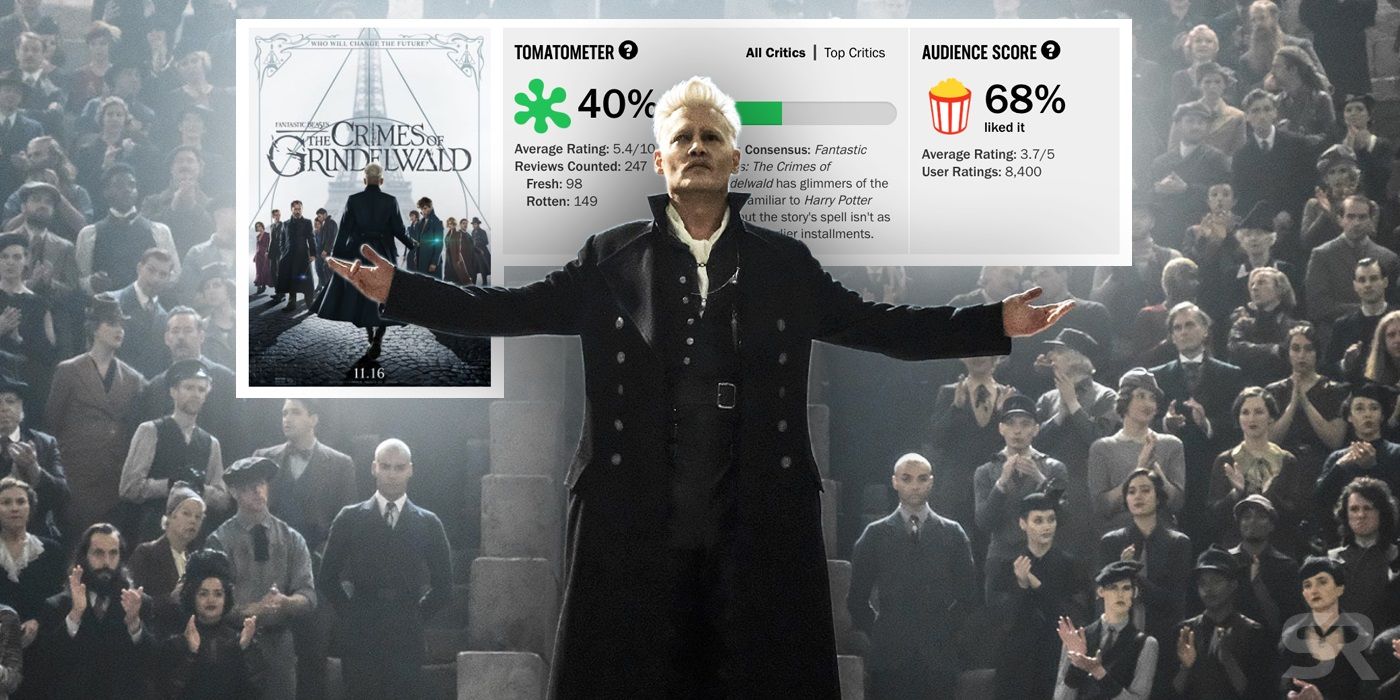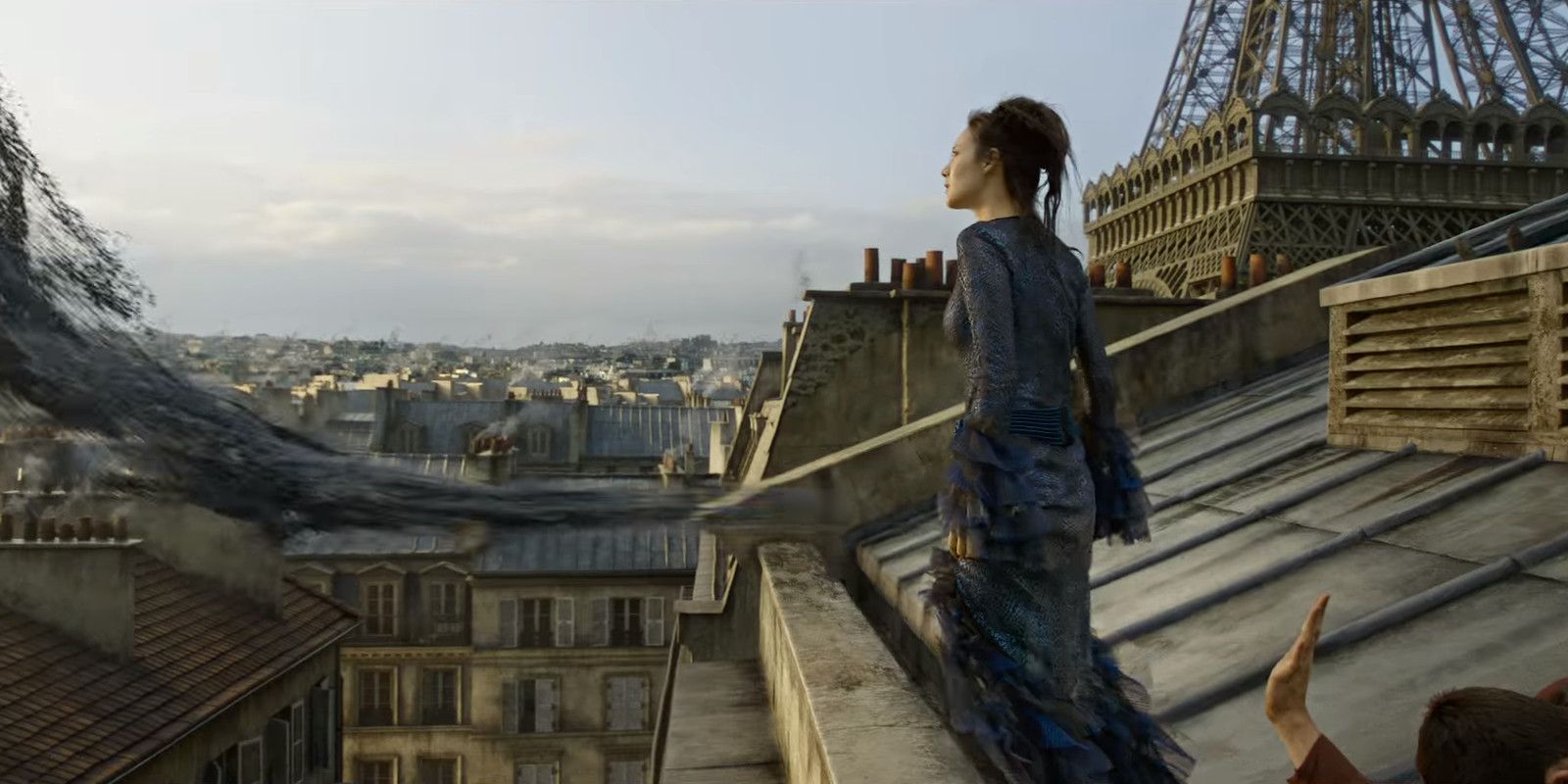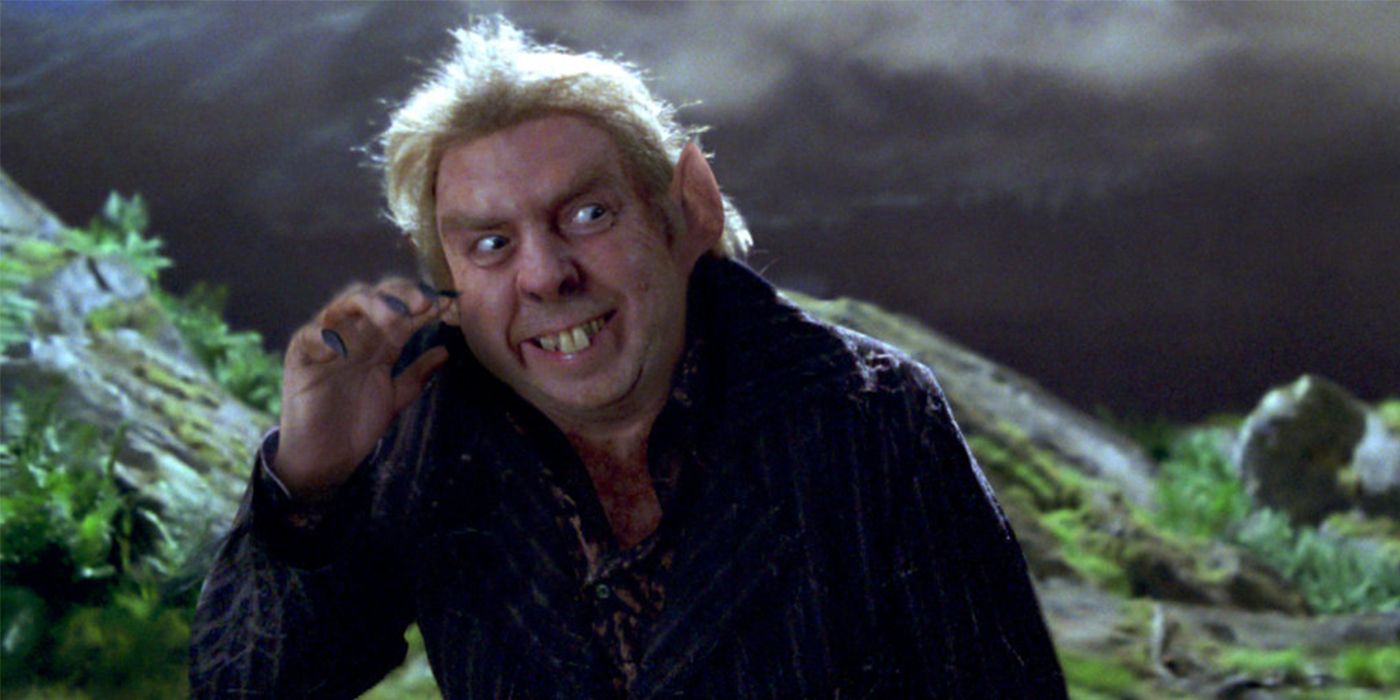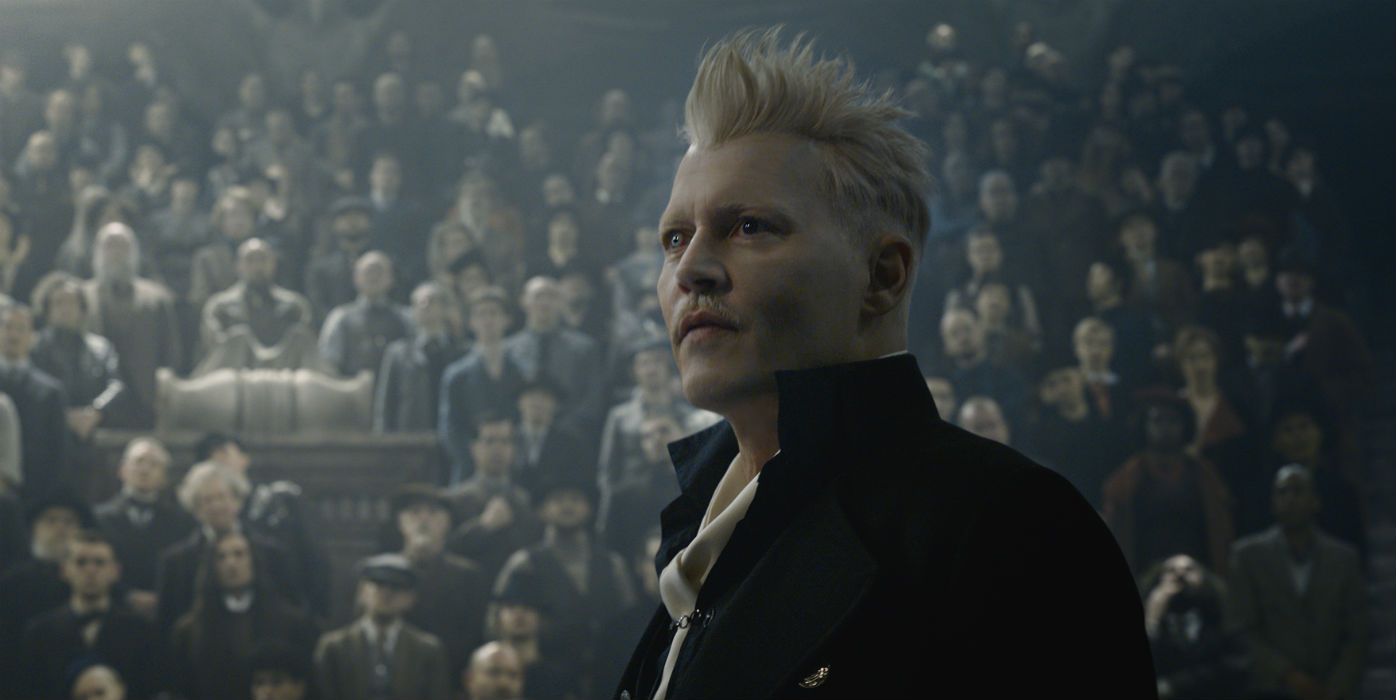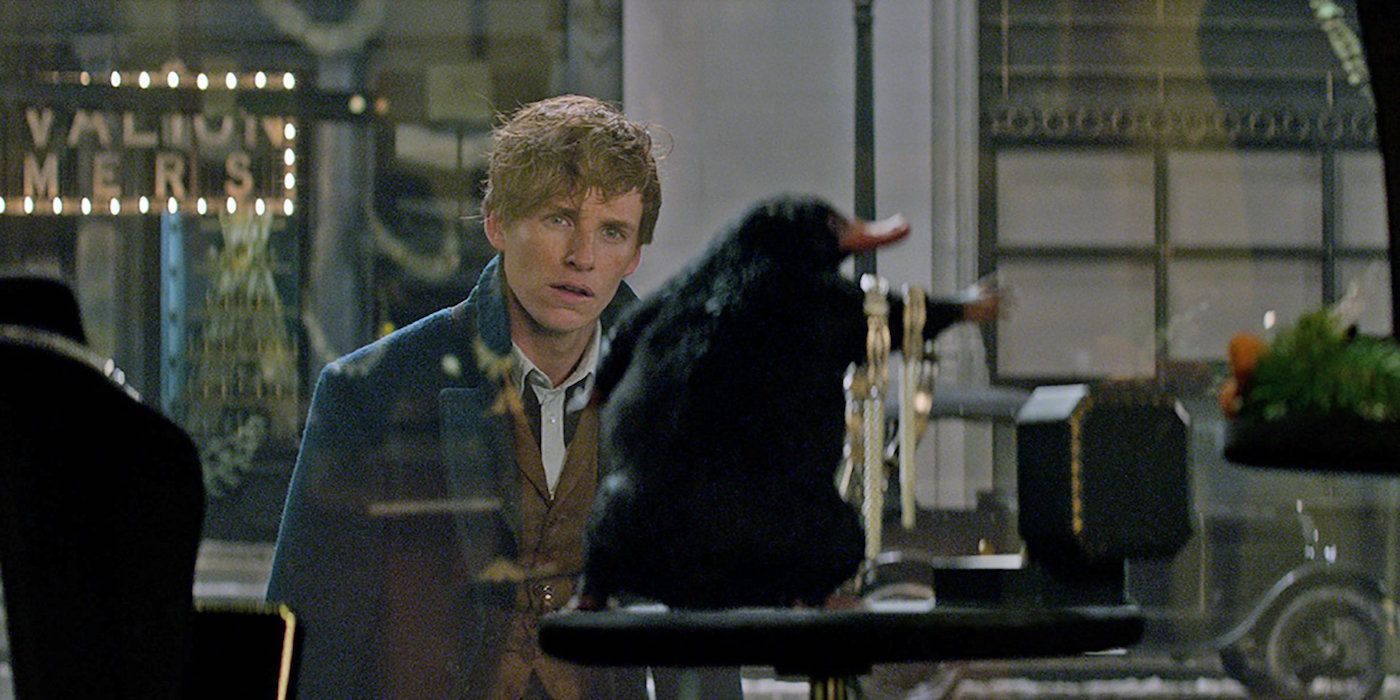Warning: SPOILERS ahead for Fantastic Beasts: The Crimes of Grindelwald
Fantastic Beasts: The Crimes of Grindelwald has been in theaters for a week, and critics and moviegoers alike have been delighting in lampooning it. The movie holds a dismal score of 40% on Rotten Tomatoes, and its more outlandish plot elements have become the target of widespread mockery.
The response isn't surprising, given that The Crimes of Grindelwald was hated by many before it was ever released: for keeping Johnny Depp around despite allegations of domestic abuse; for the reveal that Voldemort's snake, Nagini, was actually a human woman cursed to eventually turn into a beast; for the fact that Depp's Grindelwald and Jude Law's Dumbledore didn't have any scenes together and therefore their supposed romantic relationship wouldn't be made explicit; and, of course, because no one had really asked for a five-movie prequel series starring the author of one of Harry Potter's school textbooks.
Related: The Most Brutal Reviews of Fantastic Beasts: The Crimes of Grindelwald
Hating on a movie can be a fun group activity (see also: Batman V Superman), and defending a hated movie is decidedly a lot less fun. But while there are certainly criticisms to be made of The Crimes of Grindelwald - from its meandering, largely unstructured plot to Dumbledore's disappointingly conservative wardrobe - there are other criticisms that feel like a bit of a stretch, and the movie has some genuinely excellent elements that have gone overlooked.
- This Page: Fantastic Beasts 2's Controversies & Harry Potter Precedent
- Page 2: Grindelwald vs. Voldemort & Fantastic Beasts vs. Harry Potter
Fantastic Beasts 2 Was Hated Long Before Anyone Saw It
Those who are not particularly capital-O Online might not know that hating J.K. Rowling is a popular pastime. Based on retcons like the announcement that Dumbledore was secretly gay the whole time, and Nagini was originally an Asian woman who permanently turned into a snake, Rowling has been characterized as a clueless white woman clumsily trying to add diversity to a story that had only token diversity at best when she wrote it in the 1990s and early 2000s. The general buzz of negativity towards the author was compounded when she stepped in to defend Depp's casting, and when she tried to defend Nagini's new origins by claiming that Voldemort's snake had always been based on South Asian myths of naga - humans who could turn into snakes. It seemed that every time Rowling opened her mouth to defend a controversial decision, it only made things worse.
Another aspect of the movie that drew criticism before its release were the vague answers to questions about how Grindelwald and Dumbledore's boyhood romance would be addressed. Director David Yates gave a non-committal response, while Rowling just said, "Watch this space." These annoyingly coy remarks led many (this writer included) to assume that Warner Bros. was afraid of making Dumbledore explicitly gay, and were somehow hoping to get through a five-movie franchise without his and Grindelwald's deeper relationship ever being mentioned.
The problems with pre-judging a movie became apparent when it turned out, for example, that The Crimes of Grindelwald does address Grindelwald and Dumbledore's relationship, despite the fact that the characters have no scenes together outside of flashbacks. When Travers tells Dumbledore that he heard the two of them were "as close as brothers," Dumbledore wastes no time clarifying that they were "closer than brothers." When he looks into the Mirror of Erised - an artifact that shows a person what they desire most in the world - he sees Grindelwald staring back at him. In a flashback scene, Grindelwald and Dumbledore hold hands to complete their blood oath, staring deep into each other's eyes. The movie may not state in plain language that the two of them were romantically involved, but you'd have to be pretty oblivious to miss all the clues. It certainly outpaces the much-hyped "LGBT representation" of last year's Beauty and the Beast, which consisted of about half a second of LeFou dancing with a man.
Related: Why Fans Are (Already) Mad At Fantastic Beasts: The Crimes of Grindelwald
The Harry Potter Books Also Had Outlandish Twists
One of the aspects of The Crimes of Grindelwald that negative reviews have hit on the most is the reveal that Credence Barebone is actually Albus Dumbledore's long-lost (and never before mentioned) brother, Aurelius Dumbledore. It's fair to say that the twists and turns regarding Credence's true identity do become hard to follow - so much so that at one point Leta Lestrange literally whips out a family tree to try and explain the situation. However, it's not fair to say that the Dumbledore twist comes entirely out of left-field. After all, Credence is an Obscurial, and the only other Obscurial we've seen mentioned in Harry Potter canon is Ariana Dumbledore.
Yes, it's a huge coincidence that Leta Lestrange should have happened to swap her own baby brother with the younger brother of Albus Dumbledore, and that they both just happened to be travelling on the same ship across the Atlantic... But it makes sense when you consider that this rare occurrence was fulfilling part of Tycho Dodonus' prophecy. By their very nature, prophecies tend to refer to incredibly specific, unusual, and unlikely events, otherwise they would be fulfilled all the time by pure accident. It's equally outlandish that Macduff should just happen to have been "from his mother's womb/Untimely ripped" and then several decades later conveniently positioned in a duel with Macbeth, a man who cannot be killed by any "man born of woman" - but that's fate for you.
The Harry Potter books were no strange to prophecies, coincidences, and major twists, and Fantastic Beasts: The Crimes of Grindelwald should be judged in accordance with the fantasy world that it's set in. There's even precedent for the exact scenario of an animal character turning out to have been a transformed human all along, since that was one of the big twists of Harry Potter and the Prisoner of Azkaban. Is the Nagini reveal really any more ridiculous than the Scabbers reveal?
Page 2: Grindelwald vs. Voldemort & Fantastic Beasts vs. Harry Potter
Gellert Grindelwald Is A Great Villain (Despite Johnny Depp)
To first address the elephant in the room - yes, keeping Johnny Depp around as Gellert Grindelwald was probably a mistake. Colin Farrell delivered an extremely compelling performance as the villainous wizard (in disguise) in Fantastic Beasts and Where to Find Them, and trading him in for Depp at the end of the movie felt like a downgrade - especially given the physical transformation into yet another Johnny Depp character with heavy make-up and silly hair. But The Crimes of Grindelwald works with the Grindelwald that it has, Depp manages to deliver a serviceable (and blessedly restrained) performance, and Grindelwald's characterization is actually one of the strongest elements of the movie.
Lord Voldemort was a more straightforward villain: interested in immortality and power, and amassing a group of followers who wanted to leech some of that power. Voldemort never offered any pretence of being a good guy; in his own words, he believed that, "There is no good and evil, there is only power and those too weak to seek it."
Related: Fantastic Beasts: The Crimes of Grindelwald's Ending & Twists Explained
By contrast, Grindelwald is particularly unsettling because he shrouds his bigotry towards muggles in euphemism - discouraging his followers from using openly hateful rhetoric, and claiming that he's only interested in "the greater good." It's far more insidious than Voldemort's brute-force power-seeking, and Grindelwald is arguably a more terrifying villain because of it. One of the most widely-criticized aspects of the movie is the moment when Grindelwald shows his gathered audience a vision of the future, terrifying them with the threat of World War II and the Holocaust, and using that fear to justify the persecution of all muggles. Critics have scorned the movie for invoking a real-life mass tragedy in a movie about wizards and Nifflers, but we've known for a long time that Grindelwald's rise to power happened parallel to the rise of Nazism (canonically, Dumbledore defeats Grindelwald in 1945).
Moreover, this is far from the first time that a fantasy or sci-fi film aimed at younger audiences has invoked the spectre of the Holocaust. Bryan Singer's X-Men opens with Magneto discovering his powers as he desperately tries to reach his family in Auschwitz. The Crimes of Grindelwald had to come up with a plausible explanation for why a man like Grindelwald would attract so many followers, and Grindelwald invoking the remembered trauma of World War I and the threat of World War II (while professing to be the wizarding world's only chance at salvation) is as convincing as it is chilling.
The Crimes of Grindelwald's Ending Is Pure Harry Potter
A wonderful detail of Fantastic Beasts: The Crimes of Grindelwald's ending is Newt's pet Niffler managing to sneak off with the trinket sealing Grindelwald and Dumbledore's blood oath. The Harry Potter books and movies, from the very start, reinforced the idea that the most humble creatures in the world can also be the ones to save it - precisely because they are overlooked by people like Voldemort and Grindelwald, who value power above all things. Dobby, a house-elf, was integral to Harry's escape from the clutches of the Malfoy mansion in Harry Potter and the Deathly Hallows. In the very first book, Gryffindor's worst student, Neville Longbottom, wins the House Cup because of his bravery in standing up to his friends, and in the final book Neville kills Nagini, who is also one of Voldemort's Horcruxes, making it possible for Voldemort himself to be defeated.
Many people have questioned why Newt Scamander, of all people, is the protagonist of a series about Dumbledore's conflict with Grindelwald (rather than Dumbledore himself). After all, Newt is a shy, socially-awkward eccentric who wants nothing more than to travel the world finding interesting animals and caring for his own menagerie. But it's precisely because of Newt's humility that he is the perfect soldier in the fight against Grindelwald. The dark wizard barely even acknowledges Newt in the movie's final battle, and one of his most precious possessions - something that no one could have forcefully taken from him - is stolen away by a Niffler without him even noticing, because Grindelwald would never consider a Niffler as being worthy of attention.
-
There are perfectly valid criticisms of Fantastic Beasts: The Crimes of Grindelwald, but the boiling pot of outrage that marked the lead-up to release means that a lot of the hate towards it feels overblown. There are still three more movies in which underserved characters like Nagini and Theseus can be given more screen time and deeper characterization, and Fantastic Beasts' long game can be revealed. If there's one lesson to be taken away from The Crimes of Grindelwald, it's that we should wait until those movies come out to judge them, and perhaps even give them the benefit of the doubt when we do.

